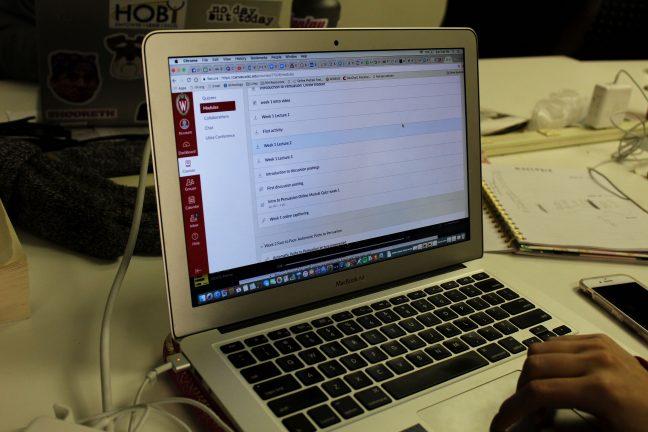Technology is everywhere. It’s the first thing we see when we snooze our alarm in the morning, and the last thing we see while scrolling through Twitter before we go to sleep. Living in the digital age allows technology to pervade nearly every aspect of human life. The digital age is the time after “the introduction of the personal computer with subsequent technology introduced providing the ability to transfer information freely and quickly.” Although the ability to send information freely and quickly sounds convenient, it may not be the correct approach for certain goals, such as education.
Given that technology is so prevalent and attainable, it’s no wonder online classes have become so popular. This semester, the University of Wisconsin offers 207 online classes ranging from art to consumer finance. Summer 2018, UW will offer a whopping 296 online-course options with a range of subjects even more extensive than the spring semester. This is a golden opportunity for out-of-state students who can’t live in Madison year-round to get ahead or a convenient alternative for students with a demanding schedule during the semester. But, do online classes really provide the same thorough education as a traditional classroom setting? It depends on who takes the class and which option he or she takes.
https://badgerherald.com/opinion/2017/11/02/to-combat-low-grade-distributions-stem-courses-should-tweak-their-style/
There’s been a surge of staggering evidence claiming the growth of online education hinders the success of students who need it the most: Less proficient students who are in need of face-to-face time with skilled educators. These types of students tend to take more online coursework and do significantly worse than students who took the same class in a traditional setting.
Similarly, more nontraditional students tend to take online courses. They are more likely to be older, work full-time jobs, be first-generation college students or be single parents. Regardless of demographic, it takes a lot of self-discipline to actually listen to lectures and take notes when online shopping is only a tab away, or to sit and work out a homework assignment when the answers are so easy to find on Quizlet. Online classes may be more convenient for less-proficient or nontraditional students, but when coupled with the social obstacles and the ease of distraction, online classes are clearly the wrong choice.
Consequently, there should be a program through academic advising to evaluate the situations of students interested in online coursework, while keeping in mind the student’s line of study, schedule and lifestyle. Although it depends on the work ethic of the individual, different personal and societal implications play a role in the success of online students. If a program or set of compulsory steps for formal academic advising is not feasible at this time, students must take the responsibility to self-evaluate and decide whether or not online coursework is the best choice for success.
Blended classes are a great way to test whether or not online coursework is the right choice. As per the name, blended courses meet in-person a few times a semester, but are mostly comprised of supplementary online coursework. Studies have shown that students of all levels do just as well in blended classes as students in traditional classrooms. UW offers 87 of these courses this semester and will offer 31 during summer 2018. By testing out the waters, students can earn credit while deciding if online coursework is the right choice for future classes, saving them from failure in the future without wasting any time. An advisory program about online classes would be convenient, but students can take the initiative to decide the method of instruction that is best.
https://badgerherald.com/opinion/2018/01/23/new-etext-program-lightens-students-load-fattens-wallet/
Technology makes life easier — that’s its whole purpose. More difficult coursework in a more complex format, however, makes the degrees we earn more valuable. Online education constantly evolves, so this opinion is by no means set in stone. But, to paraphrase poet Robert Frost, taking the more difficult way — or the road less taken — makes all of the difference.
Abby Steinberg (abigailsteinberg@outlook.com) is a freshman majoring in political science and intending to major in journalism.


